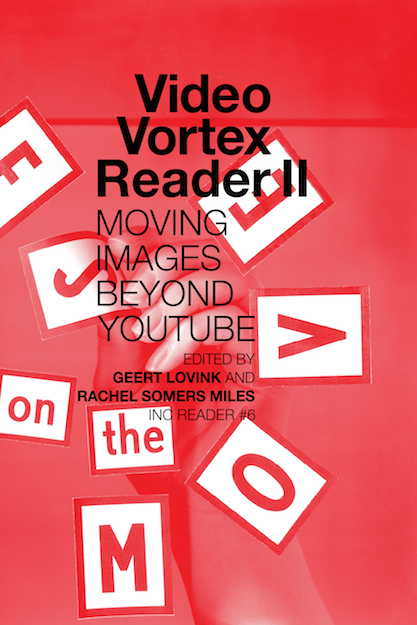Dirk De Wit, Nele Samyn (eds.): Media Art and Digital Culture in Flanders, Belgium (2011)
Filed under brochure | Tags: · belgium, education, media art, media culture

The publication presents a selection of some 100 media artists and organizations who have already developed a practice of their own, have met with international response and are located in Flanders and Brussels. This selection of short bios and photos is situated through a concise historical outline, an essay by Pieter Van Bogaert on attention for media and DIY and an essay by Liesbeth Huybrechts on crossover and lab culture.
Publisher: BAM, Flemish institute for visual, audiovisual and media art, Ghent
146 pages
Geert Lovink, Rachel Somers Miles (eds.): Video Vortex Reader II: Moving Images Beyond YouTube (2011)
Filed under book | Tags: · aesthetics, human rights, internet, media activism, network culture, online video, politics, theory, video, video art, youtube

“Video Vortex Reader II is the Institute of Network Cultures’ second collection of texts that critically explore the rapidly changing landscape of online video and its use. With the success of YouTube (’2 billion views per day’) and the rise of other online video sharing platforms, the moving image has become expansively more popular on the Web, significantly contributing to the culture and ecology of the internet and our everyday lives. In response, the Video Vortex project continues to examine critical issues that are emerging around the production and distribution of online video content.
Following the success of the mailing list, the website and first Video Vortex Reader in 2008, recent Video Vortex conferences in Ankara (October 2008), Split (May 2009) and Brussels (November 2009) have sparked a number of new insights, debates and conversations regarding the politics, aesthetics, and artistic possibilities of online video. Through contributions from scholars, artists, activists and many more, Video Vortex Reader II asks what is occurring within and beyond the bounds of Google’s YouTube? How are the possibilities of online video, from the accessibility of reusable content to the internet as a distribution channel, being distinctly shaped by the increasing diversity of users taking part in creating and sharing moving images over the web?”
Contributors: Perry Bard, Natalie Bookchin, Vito Campanelli, Andrew Clay, Alexandra Crosby, Alejandro Duque, Sandra Fauconnier, Albert Figurt, Sam Gregory, Cecilia Guida, Stefan Heidenreich, Larissa Hjorth, Mél Hogan, Nuraini Juliastuti, Sarah Késenne, Elizabeth Losh, Geert Lovink, Andrew Lowenthal, Rosa Menkman, Gabriel Menotti, Rachel Somers Miles, Andrew Gryf Paterson, Teague Schneiter, Jan Simons, Evelin Stermitz, Blake Stimson, David Teh, Ferdiansyah Thajib, Andreas Treske, Robrecht Vanderbeeken, Linda Wallace, Brian Willems, Matthew Williamson, Tara Zepel.
Publisher Institute of Network Cultures, Amsterdam, 2011
Creative Commons Attribution Noncommercial No Derivative Works 3.0 Netherlands License
ISBN 9789078146124
378 pages
PDF, PDF (updated on 2017-4-11)
Comment (0)Joe Karaganis (ed.): Media Piracy in Emerging Economies (2011) [EN, RU, ES, CN]
Filed under report | Tags: · bolivia, brazil, copyright, culture industry, digital media market, filesharing, india, intellectual property, market, mexico, p2p, piracy, russia, south africa

“Media Piracy in Emerging Economies is the first independent, large-scale study of music, film and software piracy in emerging economies, with a focus on Brazil, India, Russia, South Africa, Mexico and Bolivia.
Based on three years of work by some thirty-five researchers, Media Piracy in Emerging Economies tells two overarching stories: one tracing the explosive growth of piracy as digital technologies became cheap and ubiquitous around the world, and another following the growth of industry lobbies that have reshaped laws and law enforcement around copyright protection. The report argues that these efforts have largely failed, and that the problem of piracy is better conceived as a failure of affordable access to media in legal markets.
“The choice,” said Joe Karaganis, director of the project, “isn’t between high piracy and low piracy in most media markets. The choice, rather, is between high-piracy, high-price markets and high-piracy, low price markets. Our work shows that media businesses can survive in both environments, and that developing countries have a strong interest in promoting the latter. This problem has little to do with enforcement and a lot to do with fostering competition.””
Publisher The Social Science Research Council (SSRC), 2011
Distributed under a Consumer’s Dilemma license
ISBN 978-0-98412574-6
440 pages
PDF (English, added on 2018-5-11)
PDFs (4 languages, from publisher; updated 2015-5-14)
See also Shadow Libraries: Access to Knowledge in Global Higher Education, 2018.
Comments (3)
